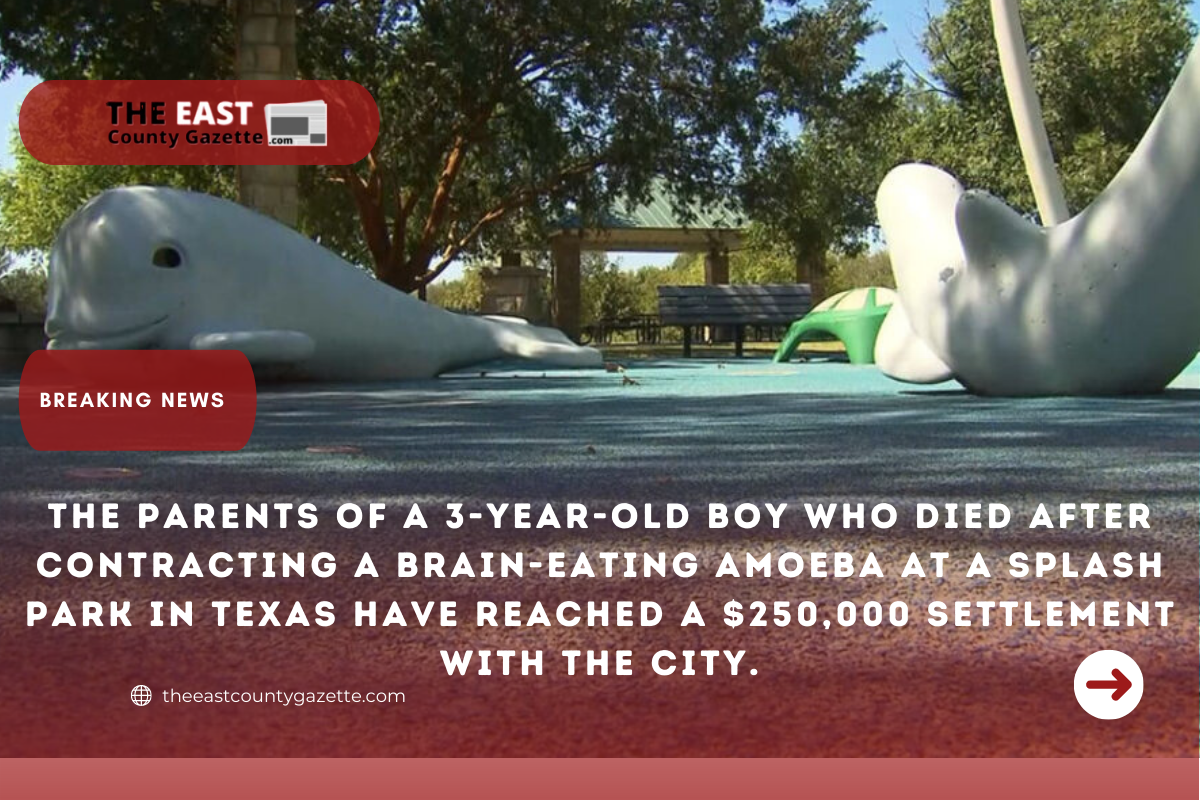The parents of a 3-year-old boy who died after contracting a brain-eating amoeba at a splash park in Texas have reached a $250,000 settlement with the city.
Arlington, Texas, has agreed to pay $250,000 to the parents of a 3-year-old boy who died last year after contracting a brain-eating amoeba at a splash park.
As previously reported by CNN and affiliate KTVT, Bakari Williams died last September after being hospitalized for five days with primary amoebic meningoencephalitis, an uncommon and often fatal condition caused by an amoeba called Naegleria fowleri.

Officials ultimately concluded that Williams got his infection from a splash pad that had been poorly tested and maintained.
It was made clear at a press conference by Williams’ parents’ counsel that the child’s death could have been avoided.
According to KTVT, family lawyer Brian Hargrove noted that $250,000 is the highest amount of money a family may get from a city under the Texas Tort Claims Act.
Arlington announced in a statement that the settlement will include “major investments in the installation of health and safety equipment and other improvements to our public pools and splash pads.” Arlington
Bakari Williams Protocol is a new policy handbook that the city plans to distribute, according to Hargrove and the city. Our hard lessons will be shared with other entities in the aquatics business, according to the city.
According to a statement received by KTVT, new technology will immediately cut off any splash pads where water measurements are not in the appropriate ranges and QR codes will allow visitors to get real-time information regarding water quality.
“Please know that Bakari was a beautiful, kind, and innocent child who did not deserve to die in this way. The lawsuit was mostly about educating the general public, “According to the local network, Williams’ mother, Kayla Mitchell, made the announcement during a press conference.
“Make sure nothing like this ever happens again. Because of what happened to our kid and our family, we don’t want anything similar to happen to anyone else “Mitchell said.
According to the Centers for Disease Control and Prevention, Naegleria fowleri is typically found in soil and fresh warm water, such as lakes, rivers, and hot springs (CDC). Poorly maintained or unchlorinated pools can also be a source of this bacteria.
According to the CDC, amoeba enters the human body through the nose and infects people. Once inside, the amoeba goes up the nose to the brain, where it eats away at the brain tissue, according to the Centers for Disease Control and Prevention
Inquiry into the origin of the disease.
An announcement made by the city and Tarrant County on September 5 stated that the hospital had informed them of the child’s condition on September 5. Two likely sources of exposure to the amoeba have been identified by the county health department: the family’s residence in Tarrant County and the Don Misenhimer Park splash pad in Arlington.
The splash pad was shut down immediately, according to the city’s news release, and the other three public splash pads were shut down for the rest of the year as a precaution.
After conducting testing on water samples from the park, the Centers for Disease Control and Prevention determined that the youngster was most likely exposed to Naegleria fowleri amoeba, which was shown to be active, on September 24.
“It shatters my soul. There are five grandchildren under the age of seven living with my wife and me. To have to bury a child or grandchild in that manner is beyond my comprehension “At the time, Arlington Mayor Jim Ross told KTVT.
Low amounts of chlorine are probably to blame.
The splash pad’s upkeep, equipment, and water testing processes were investigated by the city of Arlington. According to officials, there was room for improvement in the water quality testing results.
Deputy City Manager Lemuel Randolph noted in a 2021 news release that “we have uncovered vulnerabilities in our daily inspection procedure.” “Our splash pad maintenance criteria were not met as a result of these deficiencies.
If our systems don’t work properly, and we can establish a maintenance schedule that meets municipal, county, and state regulations, we will keep all splash pads closed.”
Employees at Don Misenhimer Park’s splash pad did not routinely record or conduct water quality testing that is necessary before the facilities open each day, according to a news release cited by the New York City Department of Parks and Recreation. This includes screening for disinfectant chlorine, which is found in many products.
Two of the three days that the youngster attended the park in late August and early September were found to have no water chlorination readings, according to a news release.
Two days prior, documents showed appropriate chlorination levels, according to a press release. It was only the following day that a new documented reading was taken and found that the water’s chlorine level had dropped below the required level and that additional chlorine had been supplied to the system.”

